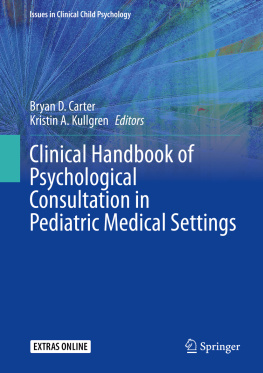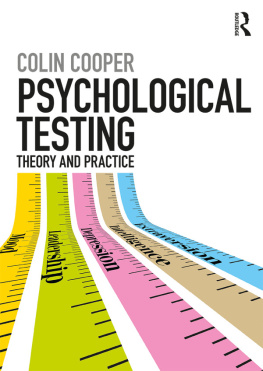Cover

| title | : | Psychological Testing in the Age of Managed Behavioral Health Care |
| author | : | Maruish, Mark E. |
| publisher | : | Lawrence Erlbaum Associates, Inc. |
| isbn10 | asin | : | 0805836438 |
| print isbn13 | : | 9780805836431 |
| ebook isbn13 | : | 9780585386188 |
| language | : | English |
| subject | Psychodiagnostics, Managed mental health care. |
| publication date | : | 2002 |
| lcc | : | RC469.M367 2002eb |
| ddc | : | 616.89/075 |
| subject | : | Psychodiagnostics, Managed mental health care. |
Page i
This page intentionally left blank
Page ii
Psychological Testing in the Age
of Managed Behavioral Health Care
Page iii
Psychological Testing in the Age
of Managed Behavioral Health Care
Mark E. Maruish
United Behavioral Health

Page iv
Copyright 2002 by Lawrence Erlbaum Associates, Inc.
All rights reserved. No part of this book may be reproduced in any form, by
photostat, microfilm, retrieval system, or any other means, without prior written
permission of the publisher.
Lawrence Erlbaum Associates, Inc., Publishers
10 Industrial Avenue
Mahwah, NJ 07430
| Cover design by Kathryn Houghtaling Lacey |
Library of Congress Cataloging-in-Publication Data
Maruish, Mark E. (Mark Edward)
Psychological testing in the age of managed behavioral health care/ Mark E. Maruish
p. cm.
Includes bibliographical references and index.
ISBN 0-8058-3643-8 (cloth: alk. paper)
1. Psychodiagnostics. 2. Managed mental health care.
RC469.M367 2002
616.89'075dc21 |
2001040511
CIP |
Books published by Lawrence Erlbaum Associates are printed on acid-free paper, and
their bindings are chosen for strength and durability.
Printed in the United States of America
10 9 8 7 6 5 4 3 2 1
Page v
To those friends and colleagues who have encouraged
and supported my work over the years.
Page vi
This page intentionally left blank
Page vii
Contents
Preface | ix |
Acknowledgments | xi |
Introduction | |
Potential Applications of Psychological Testing | |
Authorization of Psychological Testing and Assessment | |
Psychological Test Instruments, Technology, and Criteria
for Their Selection | |
Useful Psychological Measures for Managed Behavioral
Health Care Systems | |
Issues and Considerations in Developing Test-Based
Outcomes Assessment Programs | |
Implementing Test-Based Outcomes Assessment Systems | |
Applications and Opportunities in Primary and Integrated
Care Settings | |
Ethical and Professional Issues | |
Page viii
References | |
Author's Note | |
Author Index | |
Subject Index | |
Page ix
Preface
The growth of managed care as the predominant form of general health care delivery has had an enormous impact not only on patients, but also on practitioners, insurers, employers and other parties that have a stake in the care and well-being of patients. Adapting to this system of health care has not been an easy one for mental health and substance abuse professionals, particularly psychologists. In addition to limitations placed on the other services they provide, psychologists have seen dramatic restrictions imposed by managed behavioral health care organizations (MBHOs) on their use of psychological testing. For some, these restrictions have resulted in a loss of not only income, but also the freedom to exercise professional judgment in the assessment and treatment of their patients.
Contrary to earlier predictions, managed care is not a fad and it will not be going away any time soon. In fact, continued growth is expected. Although some may view the continuation of managed care with a sense of fear and anxiety, there are indeed positive aspects of this system of health care. For example, stakeholders in the managed health care delivery system will continue to influence the operation of managed care organizations (MCOs) and the benefits they manage. There also will be a continued focus on the development of empirically based guidelines, the measurement and management of outcomes, and the quality of care in general. Psychologists who are willing to work within the constraints of the policies and procedures of MBHOs, to develop new approaches to psychological testing and treatment, and to diversify their practices to include nontraditional activities should find the practice of psychology professionally satisfying and rewarding. In short, the opportunities are and will be there for those who are willing to evolve as this country's health care system evolves. This fact has served as the impetus for this book.
To provide a context for the remainder of the book, chapter 1 presents a general overview of managed care in general and managed behavioral health care specifically. Among the topics discussed are the distinctions among the various types of MBHOs, the positive and negative effects of managed care, the status of psychological testing in MBHOs, and recommendations for how psychologists can survive in this new era of health care.
Page x
Chapter 2 presents a discussion of the many ways in which testing can help MBHOs meet some of the pressures that are placed on them by various external parties. In essence, these pressures represent potential opportunities for psychologists.
Chapter 3 offers a general description of the service delivery process in MBHO settings, including where psychological testing fits into that process. Also included here are common criteria used by MBHOs to determine whether testing should be authorized or not, along with recommendations for what psychologists can do to increase the likelihood that MBHOs will authorize their requests for psychological testing.
A discussion of the various types of psychological test instruments that can be useful in MBHO settings is presented in chapter 4. Also presented is a review of the criteria recommended for selecting instruments for general and specific uses. In addition, there is a discussion of some of the technological advances that have been applied to the administration, scoring, and interpretation of psychological tests.
Whereas the reader is likely familiar with the more popular commercial psychological test instruments (e.g., MMPI-2, SCL-90-R), there are a number of low- or no-cost psychological instruments that can be useful in MBHO settings. Several of these instruments are presented and discussed in detail in chapter 5.
Next page










